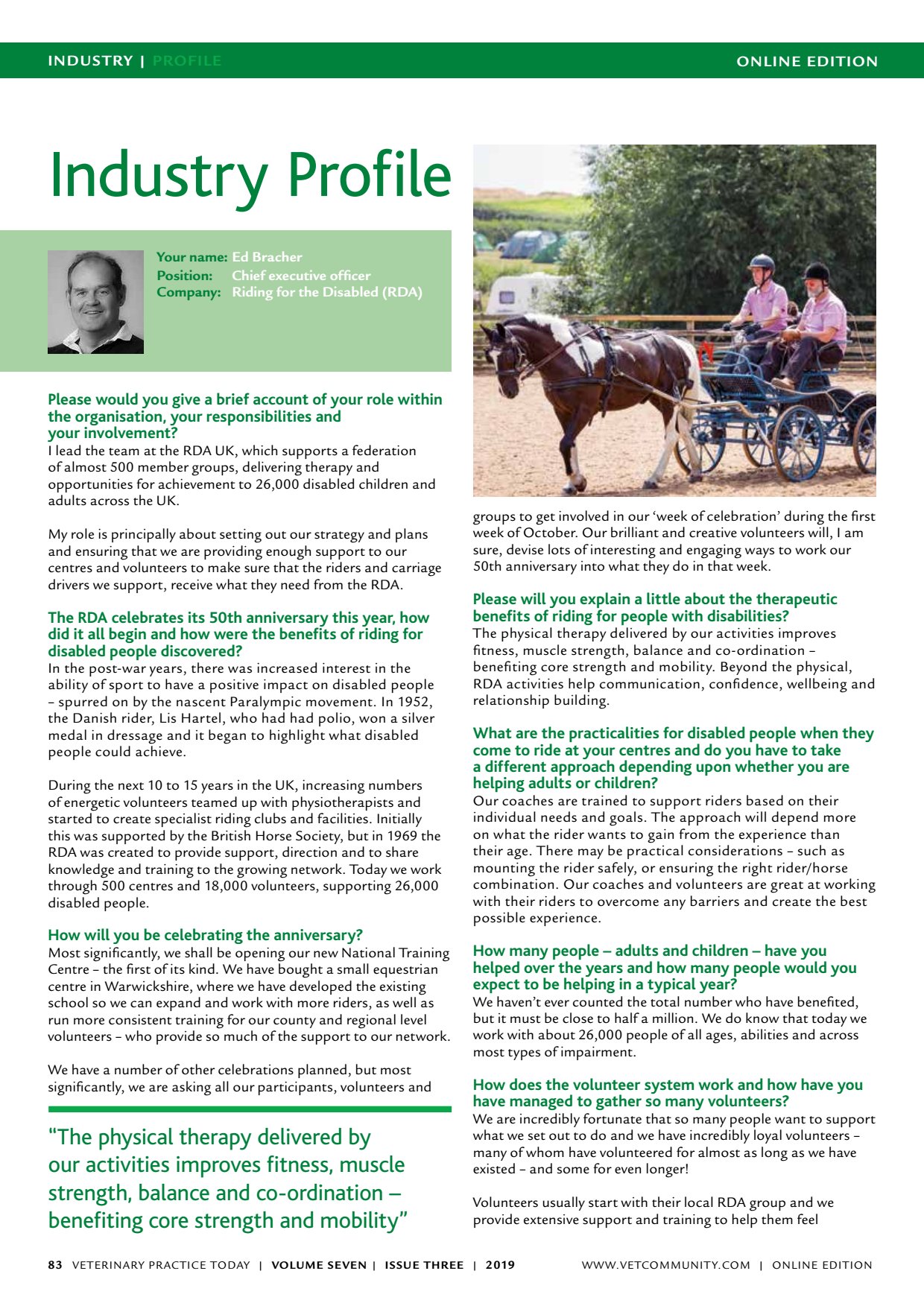Industry Profile Please
ONLINE EDITIONINDUSTRY | PROFILE VETERINARY PRACTICE TODAY | VOLUME SEVEN | ISSUE THREE | 2019 83 Industry Profile Your name: Ed Bracher Position: Chief executive officer Company: Riding for the Disabled (RDA) Please would you give a brief account of your role within the organisation, your responsibilities and your involvement? I lead the team at the RDA UK, which supports a federation of almost 500 member groups, delivering therapy and opportunities for achievement to 26,000 disabled children and adults across the UK. My role is principally about setting out our strategy and plans and ensuring that we are providing enough support to our centres and volunteers to make sure that the riders and carriage drivers we support, receive what they need from the RDA. The RDA celebrates its 50th anniversary this year, how did it all begin and how were the benefits of riding for disabled people discovered? In the post-war years, there was increased interest in the ability of sport to have a positive impact on disabled people spurred on by the nascent Paralympic movement. In 1952, the Danish rider, Lis Hartel, who had had polio, won a silver medal in dressage and it began to highlight what disabled people could achieve. During the next 10 to 15 years in the UK, increasing numbers of energetic volunteers teamed up with physiotherapists and started to create specialist riding clubs and facilities. Initially this was supported by the British Horse Society, but in 1969 the RDA was created to provide support, direction and to share knowledge and training to the growing network. Today we work through 500 centres and 18,000 volunteers, supporting 26,000 disabled people. How will you be celebrating the anniversary? Most significantly, we shall be opening our new National Training Centre the first of its kind. We have bought a small equestrian centre in Warwickshire, where we have developed the existing school so we can expand and work with more riders, as well as run more consistent training for our county and regional level volunteers who provide so much of the support to our network. We have a number of other celebrations planned, but most significantly, we are asking all our participants, volunteers and groups to get involved in our week of celebration during the first week of October. Our brilliant and creative volunteers will, I am sure, devise lots of interesting and engaging ways to work our 50th anniversary into what they do in that week. Please will you explain a little about the therapeutic benefits of riding for people with disabilities? The physical therapy delivered by our activities improves fitness, muscle strength, balance and co-ordination benefiting core strength and mobility. Beyond the physical, RDA activities help communication, confidence, wellbeing and relationship building. What are the practicalities for disabled people when they come to ride at your centres and do you have to take a different approach depending upon whether you are helping adults or children? Our coaches are trained to support riders based on their individual needs and goals. The approach will depend more on what the rider wants to gain from the experience than their age. There may be practical considerations such as mounting the rider safely, or ensuring the right rider/horse combination. Our coaches and volunteers are great at working with their riders to overcome any barriers and create the best possible experience. How many people adults and children have you helped over the years and how many people would you expect to be helping in a typical year? We havent ever counted the total number who have benefited, but it must be close to half a million. We do know that today we work with about 26,000 people of all ages, abilities and across most types of impairment. How does the volunteer system work and how have you have managed to gather so many volunteers? We are incredibly fortunate that so many people want to support what we set out to do and we have incredibly loyal volunteers many of whom have volunteered for almost as long as we have existed and some for even longer! Volunteers usually start with their local RDA group and we provide extensive support and training to help them feel The physical therapy delivered by our activities improves fitness, muscle strength, balance and co-ordination benefiting core strength and mobility WWW.VETCOMMUNIT Y.COM | ONLINE EDITION
